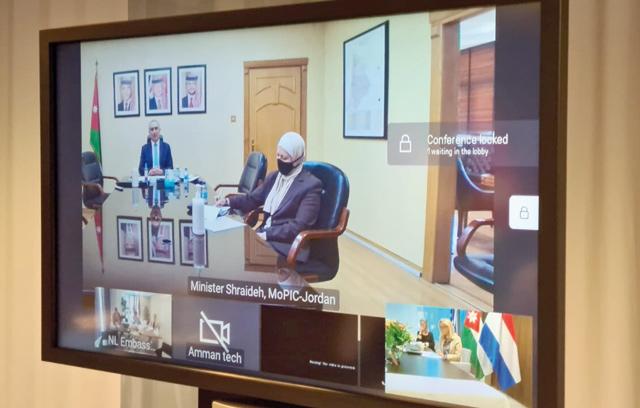- Local News
- Thu-2020-11-26 | 01:01 pm

Nayrouz News Agency :
The Dutch and Jordanian governments on Wednesday launched a new partnership under which the Netherlands will extend 74 million euros to help refugees and host populations access quality primary education and vocational training, secure and retain decent employment, and benefit from a strengthened protection framework.
The "Prospects Partnership in Jordan" is a four-year initiative with first joint programming initiated in 2019, the Jordan News Agency, Petra, reported.
The Netherlands will be investing 73 million euros in the partnership in Jordan until 2023, Petra reported, citing a statement released on Wednesday.
With refugees accounting for more than 10 per cent of Jordan’s population, and in a global context of refugee and forced displacement situations being increasingly longer-term, the five partners and the Netherlands pledge to build on each other’s strengths and look for sustainable solutions to forced displacement, in close coordination with the government of Jordan, according to the statement.
The Ministry of Planning and International Cooperation indicated that the initiative will be implemented by the International Finance Corporation (IFC), the International Labour Organisation (ILO), the United Nations Refugee Agency (UNHCR), the United Nations Children’s Fund (UNICEF) and the World Bank.
Sigrid Kaag, minister for Foreign Trade and Development Cooperation of the Kingdom of the Netherlands, expressed her commitment to this multiannual partnership during a virtual meeting Wednesday with Minister of Planning and International Cooperation Nasser Shraideh.
Speaking at the launch of the partnership, Shraideh said: "We hope that the Prospects Partnership initiative effectively contributes and supports Jordan in its response to the impact of the existing and emerging challenges for improving the services provided to refugees and the vulnerable Jordanians in the host communities."
He added: "Over the implementation of the Prospects Partnership, we also look forward to learning from the enriched experience of the Netherlands through a close cooperation and engagement with our social partners and the private sector to best respond to these challenges and needs."
The minister stressed that the three main components of the initiative — education, employment and livelihoods and protection — are in line with the Jordanian government’s strategies and policies, including the Jordan Response Plan, the Social Protection Strategy and the Employment Charter.
"We pay high attention to this initiative in Jordan, as we continue to be impacted by the spillover effects of the Syrian crisis, including hosting large number of refugees, in particular in the host communities," he said.
The minister noted that the current challenges had also been exacerbated by the impact of COVID-19 pandemic which he said strained the labour market dynamics, particularly in sectors hard hit by the crisis such as tourism.
Shraideh voiced hope that the "Prospects Partnership" effectively contributes and supports Jordan in its response to the impact of the existing and emerging challenges for improving the services provided to refugees and vulnerable Jordanians in the host communities.
He said: "Over the implementation of the Prospects Partnership, we also look forward to learning from the enriched experience of the Netherlands through a close cooperation and engagement with our social partners and the private sector to best respond to these challenges and needs."
The minister expressed deep gratitude to the Netherlands for the generous support extended to Jordan over the many years, which contributed in supporting implementing projects in priority areas, and in assisting Jordan in moving forward with the pace of reforms as well as in mitigating the impact of hosting Syrian refugees.
He also thanked UNICEF, UNHCR, the ILO, the IFC and the WB for partnering in this initiative.
Meanwhile, the Dutch minister said that the "Prospects Partnership" is aimed at effective collaboration, sharing data and leveraging expertise," adding: "Through close cooperation with the Jordanian government, Prospects partners are contributing to the development and self-resilience of people and communities."
Under the partnership, the World Bank commits to investing in education, livelihoods, private sector development, social protection, and service delivery, including by supporting progressive policies for refugees.
The IFC commits to bringing private sector solutions to refugees and host communities to the Partnership while UNICEF will strengthen national and regional capacities to provide education, social protection, youth services and child protection for vulnerable children and youth.
In turn, the ILO will work to strengthen inclusive socio-economic growth and decent work.
It will continue to support the improvement of working conditions for refugees and host community members; support workers to gain skills and certification for better jobs; improve labour market governance, and promote a smooth transition to formal employment.
The UNHCR, through the Partnership, will ensure the continued protection of refugees whilst also supporting refugee access to sustainable solutions.
In line with this goal, a key aspect of UNHCR’s work within the partnership focuses on supporting continued access to registration and legal documentation for refugees across the country, especially during the COVID-19 emergency through remote modalities.
The other countries benefitting from the Partnership are Iraq, Lebanon, Egypt, Uganda, Kenya, Sudan and Ethiopia. The Netherlands has pledged to invest 500 million euros in the Partnership up until 2023.









